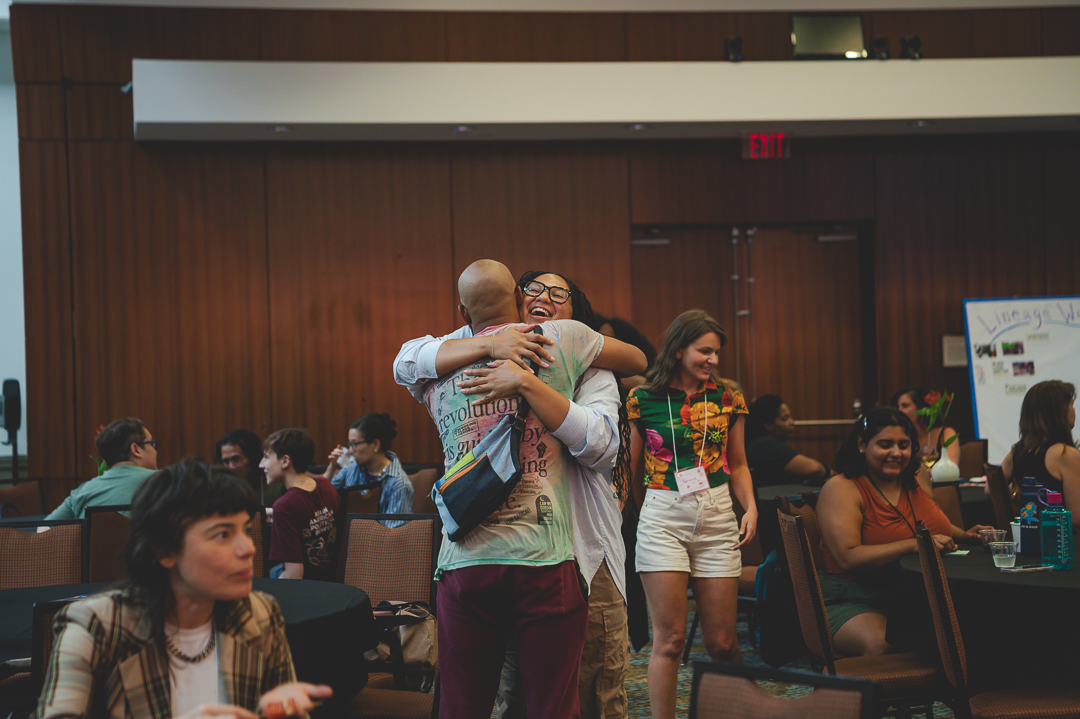
Returning to our mission, vision and values to build the narrative infrastructure we need to prevent further authoritarian consolidation.
.jpeg)
ReFrame's 2022 Year In Review!
Here at ReFrame we take a small pause every quarter, check our compass, and adjust our heading to stay the course. At the end of the year, we take a longer pause to evaluate where we’ve been and set direction for the next year. Below is a summary of the activities and impacts of ReFrame’s work in 2022. Of course, we do not do this work alone, we are moving with others to build narrative power and bend the arc of justice towards justice and liberation.
At the end of 2021/beginning of 2022 we launched our first ever Narrative Predictions. The predictions were an experiment in producing a narrative forecast for wide use across social justice organizations and movements. An amazing thing happened—y’all used it! We heard from leaders and strategists, from national networks to local organizations and philanthropic institutions, who used the predictions to ground their 2022 strategic analysis, goal setting, and planning. You can still revisit the predictions and see how well we did.
Mark your calendars: we will put out 2023 narrative predictions in January.
While the 2022 Narrative Predictions made their rounds we were hard at work on the second half of a Narrative Power Fellowship with power-building and civic engagement organizations in the Pacific Northwest. We saw growth in skills, alignment, and strategy acumen from participants like Coalition of Communities of Color in Portland, Oregon. We developed this fellowship in partnership with the movement-minded folks at Northwest Health Foundation as a part of their long-term work building progressive organizing and civic engagement infrastructure across Oregon and Washington. We built the fellowship based on ReFrame’s cornerstone mentorship program and the Gen Now Fellowship we ran in partnership with Power California from 2019 to 2021.

Speaking of the Gen Now Fellowship, we published a piece in Nonprofit Quarterly in May, Losing Forward: Lessons from Organizing for Narrative Change, which placed the fellowship in the context of a decades-long fight to shift deep narratives about taxation and governance in California and the integration of ballot initiatives and voter education. It highlights the indomitable Estef Solano, who started the fellowship as a new comms staff person at Inner City Struggle and is now the Narrative and Communications Director with a team under her.

In the early summer, we made a handful of phone calls to strategists across the country grounded in power-building organizing and leading scaled narrative fights. We invited them to join ReFrame’s inaugural Senior Narrative Power Cohort, a nine-month program launched in August for senior strategists to get peer-to-peer support. The program includes 1:1 coaching, early and exclusive access to in-motion narrative research, and a facilitated and resourced container for collaboration across geography and issue. Of the dozen people we invited to join, 11 answered the call.

Meanwhile, we were also doing work we don’t often talk about: working with partners to move the philanthropic sector to invest field-wide in narrative power building. We held workshops, presentations, and panel discussions with philanthropic decision-makers who have an impact on the racial, economic, and gender justice movements. Aligned with this work, we put our money where our mouth is and moved $60,000 to each participant in the Senior Cohort to apply to an existing or new narrative project.
In the first half of the year, we also continued our work on disinformation, leading several trainings for the Disinformation Defense League and continuing our own research and tracking as an integrated piece of understanding the larger narrative climate.
August saw our dynamic narrative research and action team at the The Women’s Convention in Texas, where we led Narrative Power 101 workshops to packed rooms of grassroots activists. The team also led story gathering and landscaping workshops on QAnon and how the conspiracy theory has directly broken apart families and relationships and been an on-ramp to right-wing organizing. These workshops were a small part of our QAnon narrative research and deprogramming work - a multiyear project in partnership with Women’s March to counter-organize right-wing recruitment across the country. As a part of this work, we’ve built a network map that identifies the various networks that move QAnon theories—something we will share publicly in 2023.

In October, in partnership with RadComms, we held the first Narrative Power Summit, which brought together more than 400 organizers, leaders, strategists, and cultural workers across issue and geography for three days of in-person and virtual plenaries, workshops, panels, fireside chats, and relationship-building spaces. Given the ongoing pandemic, we took the decision to convene in-person seriously, establishing safety protocols and choosing a location where many events could take place outdoors. Beyond the deep connections and amazing lessons learned, many attendees shared that it was the first in-person convening they felt comfortable to attend because of the COVID mitigation standards we set for participants.

We also launched our first experiment in “scaled-training” in October. Drawing on our experience hosting trainings for thousands of people in partnership with the Movement for Black Lives during the summer 2020 uprisings, we held a Narrative Power 101 training with more than 800 people from 45 states and 15 countries registered in advance. In the end, well over 400 participants participated in the training. We will take lessons from this experiment and bring more scaled training in 2023.
We also launched another experiment in October, the Signals In the Noise Beta Test. This test iterated on years of work by our dynamic research and action team to create strategic insights for use by organizers and activists. Over the course of several weeks, we used the research from our combatting Q partnership with the Women’s March as the basis for compelling content to spread the findings and engage in conversations beyond the choir. We moved beyond simply creating and distributing content and proactively searched out feedback through surveys, focus groups, and scouring comments and engagement. Not only did we get good organic reach and engagement, we learned a lot of lessons that we will bring to future content creation projects that bridge narrative research and action.
.png)
In addition to our work in the United States, we also dipped our toes in the international narrative space. From participatory research on the narrative infrastructure in Latin America to collaborating with strategists from across the world to identify and resource exploratory narrative experiments, we are building international relationships and networks that will come into play in the coming years.
Next week our staff team will retreat into the mountains of New Mexico where we will pull out lessons from 2022, plot our course for 2023, and celebrate how far we have come. I hope you find similar time with your teams, with your community, and with your families.
Onward to 2023!

An interview with Ivie Osaghae and Bia Jackson of #TeamReFrame as they are immersed in our QAnon narrative research and deprogramming work in collaboration with Women’s March. The team explores QAnon as a big tent conspiracy theory and introduces research around how people are drawn into conspiratorial practices like QAnon or Q adjacent networks.
There is a global conspiracy of elites drinking the blood of babies in order to curate magical powers, and Donald Trump is playing 5-D chess in a battle with these evil forces. Oh yeah, there are also thousands of children in captivity in tunnels under NYC among other places…
At least these are the core stories of the QAnon conspiracy theory melting the minds of hundreds of thousands of people both in and outside of the U.S., destroying families, swelling the ranks of the right-wing, and lending volume to the BIG LIE. Of course, this sprawling conspiracy theory leverages and builds on long standing anti-semitic and right-wing populist narratives.
ReFrame’s dynamic team of strategists, researchers and creatives are working closely with Women’s March to identify the most powerful networks and most salient stories in the QAnon universe. Our strategy makes way for disruptions in the QAnon network and narrows the soft on-ramp to deeper right-wing ideology and organizing.
Crystal Aryee, Bia Jackson and Ivie Osaghae of #TeamReFrame took a moment to discuss the importance of this work.
Crystal: Why is ReFrame working to interrupt QAnon’s ridiculous and laughable conspiracy theory?
Ivie: QAnon is not just a wacky idea secluded to the internet. It impacts the offline world with devastating consequences. Just take the January 6 attack on the Capitol as evidence. There is an enormous impact on Black, Brown and Indigenous communities - especially since the onset of Covid-19 when people are looking to break isolation and are in search of community. For over half a decade, QAnon has touched many parts of our political sphere and has shaped how we orient ourselves to rising fundamentalist ideology. It's important to be able to combat the rising right-wing tide that looks more innocuous than many would think.
Bia: Because of this harsh reality, we are working with Women’s March and engaging their base to create tailored interventions that can be used to inoculate families, communities, and institutions. Women’s March has built a network of tens of thousands of activists pushing back against the threat of disinformation from their base of women and feminists in suburban and rural settings. Our partnership allows us to leverage their base to combat the threat of QAnon.
At the 2022 Women’s Convention, we presented four workshops on narrative power building, disinformation, and narrative research our team did on QAnon and adjacent stories and messages. Each workshop welcomed over 100 people, some of whom shared stories of personal impact – people dealing with friends and family members who spread QAnon or Q-adjacent messaging. Since then, we’ve been training the Women’s March Digital Defenders group of 300 to create persuasive content and launch digital narrative campaigns on social media and other online platforms. We’ve also reached hundreds of thousands of people with compelling findings from the QAnon research, along with intervention and interruption recommendations, on platforms like TikTok and Instagram.
Crystal: You mentioned that QAnon touches many of our communities. Do you have a personal tie to QAnon and how have those experiences impacted your work?
Ivie: A member of my family, who is in the U.S. on an immigrant visa, came for a little bit to handle citizenship processing and ended up stuck here because of the pandemic. They spent a lot of 2020 on the internet and found a community of people adjacent to QAnon; they have since become full-blown believers. There are a lot of entry points, especially around homesteading and natural living, that lured this family member in impacting their decision to not get the Covid-19 vaccine. This means they can’t return home to be with their family and are forced to navigate the U.S. legal system.
QAnon is not just losing family or friends who may show up to something like the events of January 6 – it is also loved ones exposed to the idea that “darker things” are moving, controlling the world and government - echoes of centuries old anti-semitic narratives. What QAnon offers to people who are isolated and lonely is a connection to an insular community that offers answers – this primes people for recruitment into right-wing values and organizations. Our work of researching and identifying how our friends and family move down the rabbit hole is vital to being able to help others recognize when a loved one is being wooed by right-wing extremist messaging and what they can do about it.
Crystal: What are the biggest challenges and threats facing your research
Ivie: The biggest threat is the ever evolving nature of QAnon. As more people have gotten deplatformed from popular social networks, the places that these conspiracy theories and right-wing recruitment efforts show up start to get more concealed. Our research and strategy allows our team to find those people who have seeped into the crevices and continue to monitor the stories and messages they are spreading. It requires us to think creatively and seven steps ahead to diversify avenues for our research including things like message and content testing, polling, surveys and more.
Crystal: The research methodology used to track the QAnon network is quite advanced. Keeping in stride with this work along with training the field of organizers, what does the future of narrative power building look like?
Bia: The future is hopeful - with more organizations focusing on building narrative power at scale in tandem with organizing efforts - because they're not separate.
Ivie: Exactly. It also looks like meeting people where they consume content. We could have a presence in gaming spaces, on Youtube, and other avenues where people are taking in stories, entertainment, and information. Tik tok and the like make news stories more ubiquitous however, there is still a challenge of discerning what is useful, harmful, and newsworthy. So the future looks like a continuation of training up the next generation of strategists, communicators, and organizers who are shaping what the media looks like and seeding narratives of liberation, justice and healing for a more progressive minded future.
Crystal: The work of mapping out the QAnon network and developing interventions is undeniably a heavy burden. What brings you hope in this work?
Ivie: My hope and my sustaining energy comes from seeing my family and other people who have been impacted being able to resonate with our findings and find use in our intervention tactics. This work scratches my brain in the right way to keep me energized and refreshed and keep me on my toes about how we can continue to use our tactics, our strategies and our vision to move the needle, not just an inch but a considerable amount for a better future.
Bia: I find hope in the moments that I see my family members and my friends talking about, or having a hard conversation about a topic that I know has come up in the research quite a few times. Also, to see my nieces and nephews, who are super curious about the world, daring to be themselves. That piece deeply informs the work that we're doing because if we don't, that will be lost. And I think the other piece that really inspires me is the innovation around technology and folks telling their stories, and specifically, Black and Brown folks telling their stories in a new and re-energized way.
Be on the lookout for ReFrame’s QAnon narrative research findings and report - to be released in 2023.

Since 2015 when we launched the ReFrame Mentorship, we have been investing in leaders and organizations to build a durable, long-term narrative power infrastructure that along with organizing, can bend the arc of history towards justice. In line with this vision, we saw an opening that led us to the Senior Narrative Power Cohort.
“I needed this. Thought partnership is incredibly important, peer support can make our experiences and keep us in the work. This cohort is a great combination of head and heart.” - Sheena Rolle, Senior Director of Strategy at Florida Rising and 2022 Senior Narrative Power Cohort member
On an autumn morning in Phoenix, AZ, 11 people in a modest hotel conference room dove deep into self-reflection, and then joined together in pairs and small groups. They leaned into trust and quickly fell into connected conversations about their lives and work. If you squinted you could see new threads of connection, alignment, and vision weaving through the space, glinting in the desert sun that streamed through the windows.
The 11 people in that conference room are strategists leading scaled narrative power building efforts across the country. They come from organizations grounded in the legacy and practice of organizing and movement building. They are all members of ReFrame’s inaugural Senior Narrative Power Cohort - an eight-month program designed to support senior level strategists in their work through peer-to-peer engagement and individual coaching. Through the program, they are afforded access to real-time narrative research and $60,000 each to be applied to a narrative project of their choosing. But the cohort goes beyond support, it is a container for continued network weaving, seeding collaboration, and strengthening the social justice narrative power infrastructure.
“By the nature of this work and our current conditions, it's easy to feel isolated so I'm grateful for the container of this cohort, particularly as I am tasked to build a culture and infrastructure for communications for my organization and the broader movement.” - Jennifer Dillon, Managing Director of Communications at the Advancement Project and 2022 Senior Narrative Power Cohort member.
The inaugural Senior Narrative Power Cohort includes: Jennifer Dillon of Advancement Project, Saa’un Bell of Power California, Minister JaNaé Bates of ISAIAH & Faith in Minnesota, Jonathan Alingu of Central Florida Jobs with Justice, Sheena Rolle of Florida Rising, Sebastian Saavedra of Georgia Latino Alliance for Human Rights, Aimée Castenell of Working Families Party, Rey Wences of Unemployed Workers United, Nailah Summers-Polite of Dream Defenders, Amanda Cháves Barnes of Women’s March and Eric Brakken of Florida For All.
We called on leaders with a deep understanding and practice of organizing and narrative power building as a key piece in the journey to justice and liberation to participate in the cohort, and they answered.
Since 2015 when we launched the ReFrame Mentorship, we have been investing in leaders and organizations to build a durable, long-term narrative power infrastructure that along with organizing, can bend the arc of history towards justice. In line with this vision, we saw an opening that led us to the Senior Narrative Power Cohort.
With this groundbreaking program, we hope to usher in more strategists into similar programs for the longevity and livelihood of our movements and society.
.png)
Over 800 hundred organizers, creatives, and strategists joined ReFrame for Narrative Power 101 (in real-time and asynchronously!), to skill up and build narrative power to win.
Over 800 hundred organizers, creatives, and strategists joined ReFrame for Narrative Power 101 (in real-time and asynchronously!), to skill up and build narrative power to win. The room was electric, filled with curious leaders who were joyfully ready to secure a world with more justice, freedom, and healing for all people and the planet. Together we reviewed the fundamentals of narrative and disinformation - exploring the relationship between story, narrative, and power and discussed new approaches and practical steps for people’s everyday work.
“This training allowed me to see the long-term impacts of seeding narratives, to not be afraid to try out messaging, and to invest more time in research and studying culture - and the messages that exist and are yet to be heard.”
- Narrative Power 101 participant
During the training, we had a rich discussion about how movements can weave together stories to advance just narratives at scale, lessons we’ve learned in the field, how we find resilience and stay in the work for the long haul and much more.
“A big takeaway for me was the need to work more closely with organizers in the narrative work. We work together now but this training made me think of ways we can do that better, what questions we should be thinking about and how we can support one another to build power.”
- Narrative Power 101 participant
Participants from over 500 hundred organizations, based in small towns and big cities in 45 states in the U.S., Puerto Rico, and 15 countries across Africa, Europe, South America, and South Asia signed up to join us. They are advancing Black liberation, the right to housing, LGBTQ+ freedom, ensuring that the economy works for working people, addressing the root causes of the climate crisis, and many other sectors of social justice movements working to bring about a more just, free, and equitable world.
ReFrame will be holding more trainings in 2023. Stay tuned for more opportunities for us to connect, to deepen our practice and build narrative power together!

Opening statements from ReFrame Executive Director, Joseph Phelan, and ReFrame Deputy Director, Hermelinda Cortés, along with photos from the 2022 Narrative Power Summit.
The Narrative Power Summit brought together over 400 strategists, organizers, communicators, cultural workers and leaders for three days of workshops, fireside chats, and inspiring Ignite talks all focused around building narrative power at scale. What follows is the edited opening statements from ReFrame Executive Director, Joseph Phelan, and ReFrame Deputy Director, Hermelinda Cortés, along with photos from this powerful event.
You can also see a social media round up of the event here.
Joseph Phelan:
We all made it here. Looking around this room I see people who I personally look to for wisdom, solidarity, and leadership in the work of building the beautiful world we all want. I see Jen Dillon, the Managing Director of Communications from Advancement Project doing the most to protect voting rights. I see Jonathan Alingu who is leading the fight for worker and community justice as the Co-Director of Central Florida Jobs with Justice. I see the indomitable JaNaé Bates holding down the midwest with ISAIAH and moving the needle on narratives about policing and community safety. I see Professor Shanelle Matthews - founder of Radical Communicators Network, a long time friend, and an inspired thinker and doer when it comes to building narrative power and bringing us all forward in theory and practice.
This room is filled with some amazing people. We all made it here to the Narrative Power Summit.
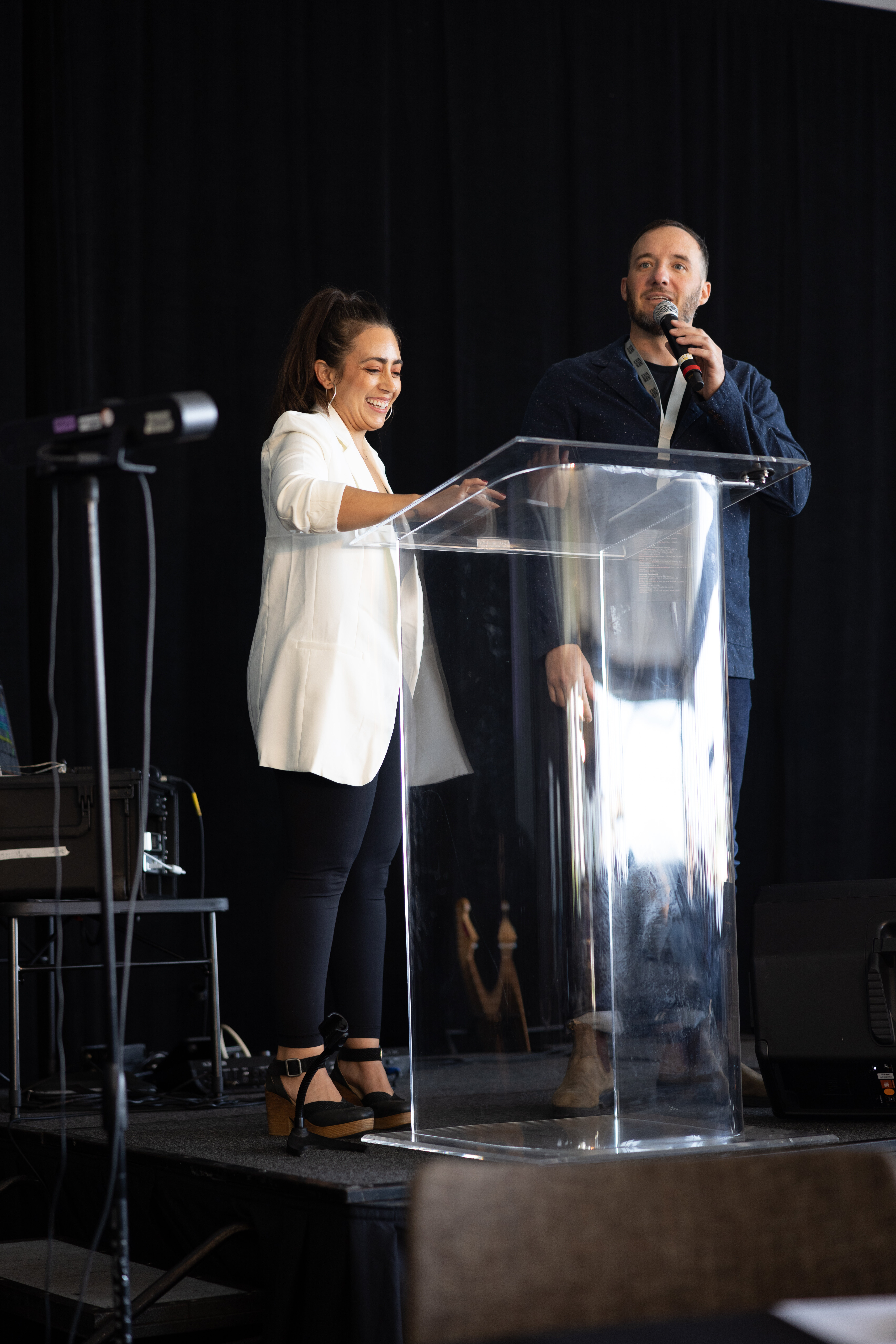
But why are we here?
As Executive Director at ReFrame it is my job to ask: Why did we put resources - money, time, people, effort, relationships - into building and holding this space with RadComms? Why did we all create the Narrative Power Summit?
The TL;DR is one day, while on a walk in Brooklyn, Shanelle said to me “ Hey, we should do this convening together.”
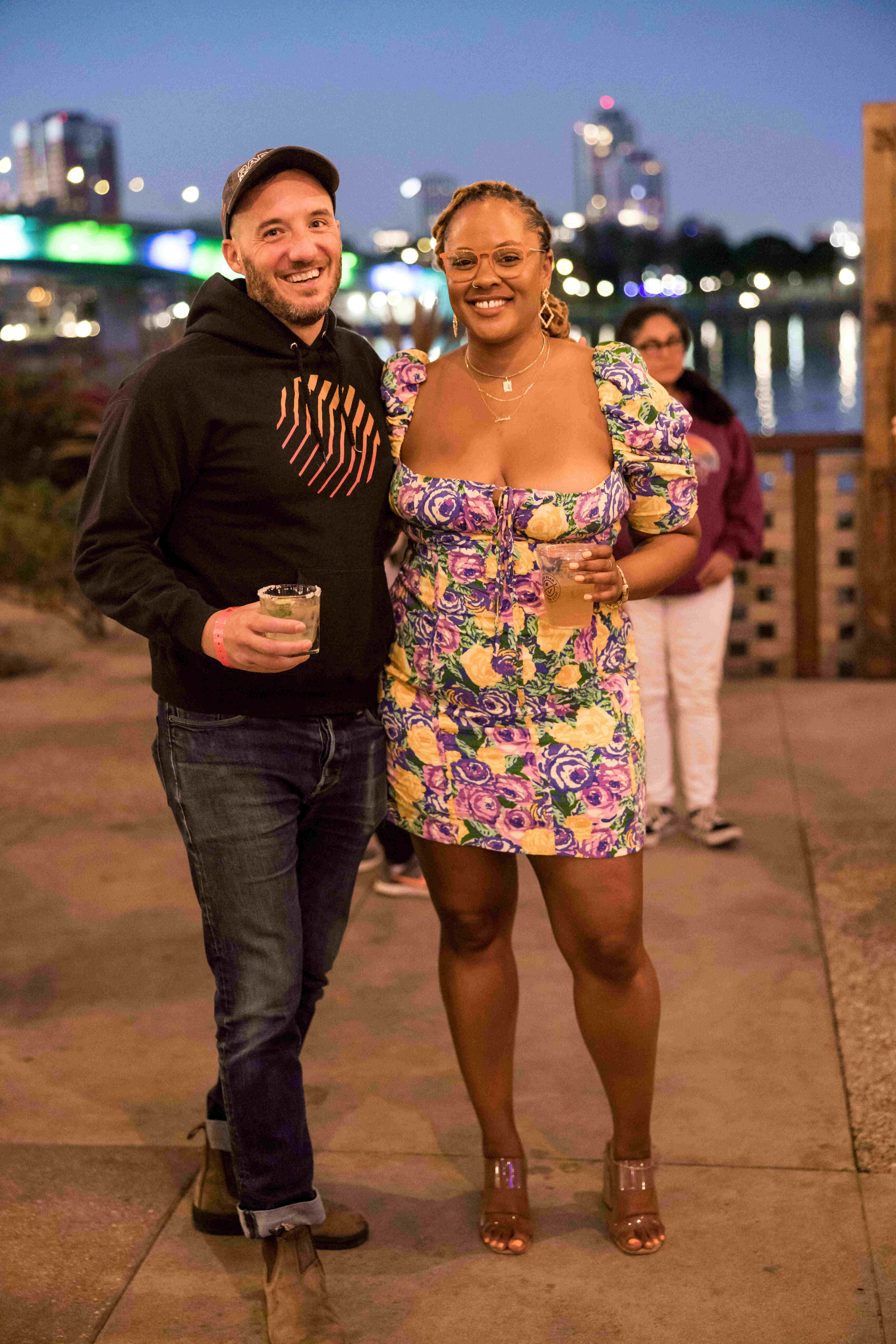
Underneath this simple idea and provocation was so much more. There were already years of working together - not just as ReFrame and RadComms - but as comrades and confidantes. Before that question, there were hours spent in vision and planning meetings; there were months spent mentoring next generation communicators and narrative strategists; and there was answering each other's calls at incredible moments of movement acceleration and power building.
Even then we were following in a lineage of organizers, strategists, and leaders who had come before.
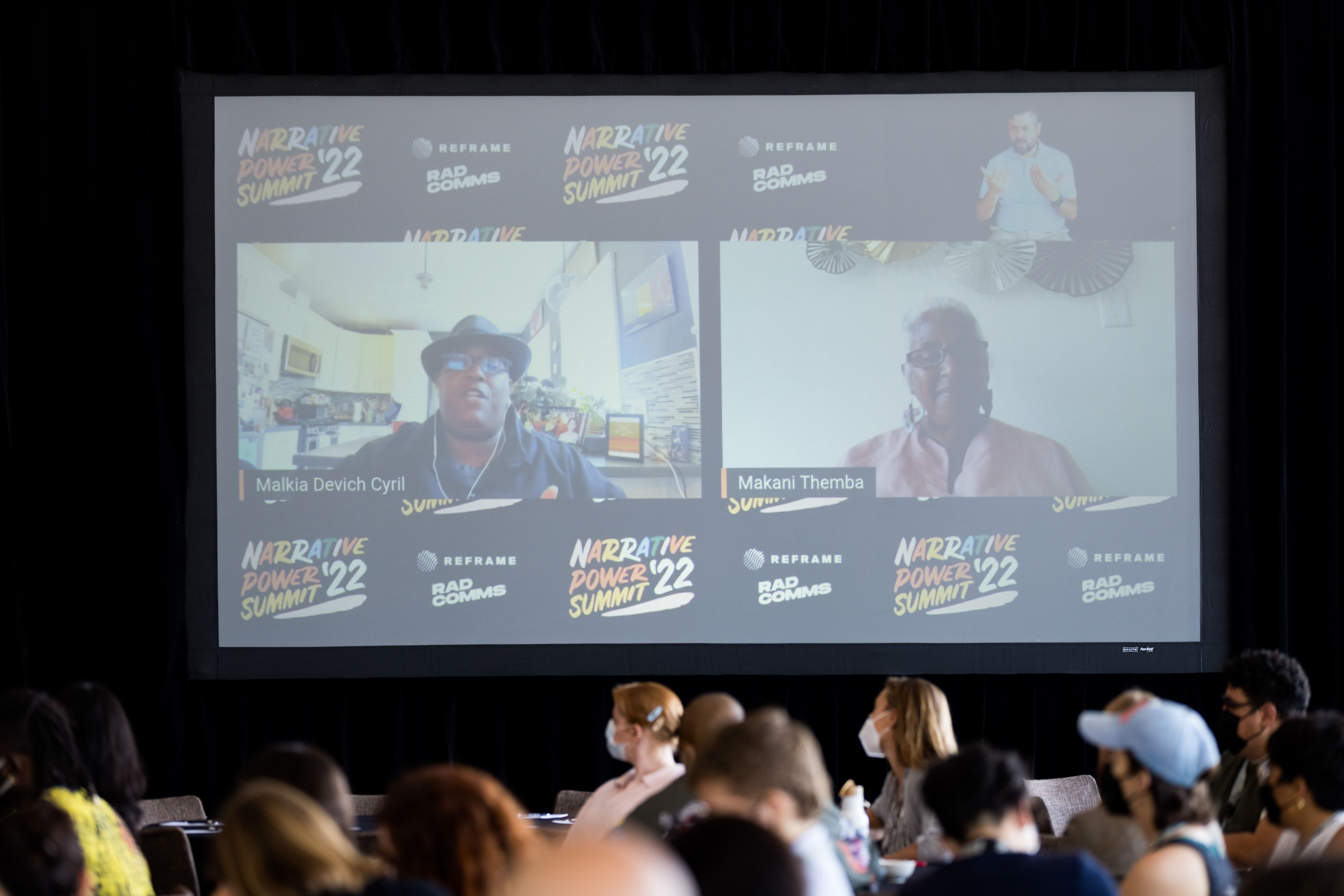
This Summit grows forth from that lineage, and pulls on the trust, experience, and vision of those times when we called on each other:
From the Alto Arizona movement where we mobilized networks of comms strategists, media makers, and cultural workers across the country to support organizers in Arizona in the fight against a “show me your papers bill”; AND elevating that fight to national audiences, using the moment to intervene on long dominant narratives about migrants and who belongs here.
To the fight against the incredulous HB2 - the infamous “Bathroom Bill” in North Carolina and beyond. The bill built on generations of racialized, homophobic and transphobic tropes - narratives that so many of us are intervening on and changing while bringing joy, hope, and a celebration of life.
To the Ferguson uprising - when the call went out so many of us answered to support either on the ground or where we lived. We elevated stories and engaged in narrative battle fueled by popular uprising which continued through the years.
And so many more examples.
When we answered the call and showed up - we found new allies, new friends, and ultimately we built relationships that undergird movements.


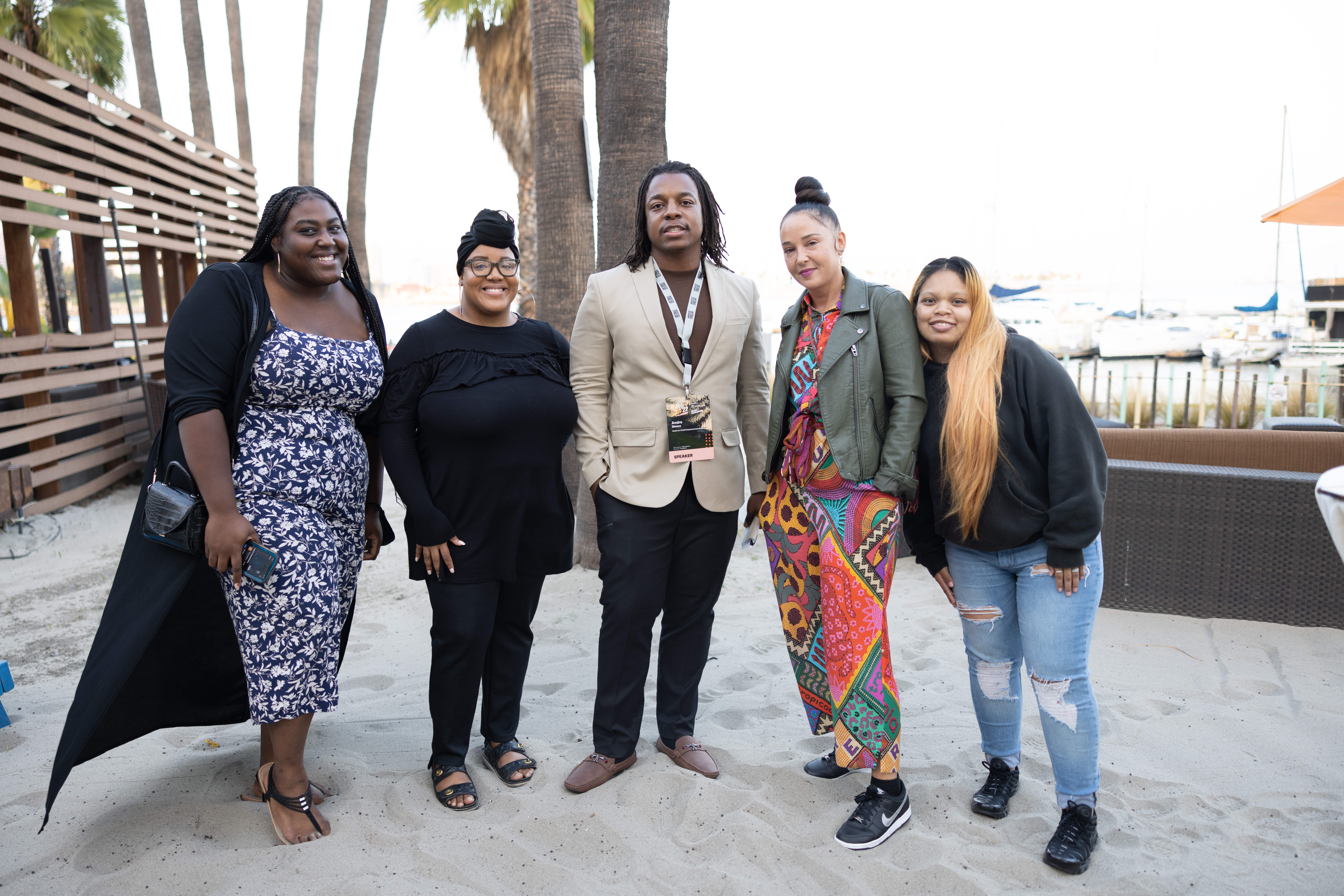
Underneath that idea from Shanelle to create this Summit together there was trust, shared vision, and shared experience. Underneath it, simply, was a relationship that spanned from personal into deeply political.
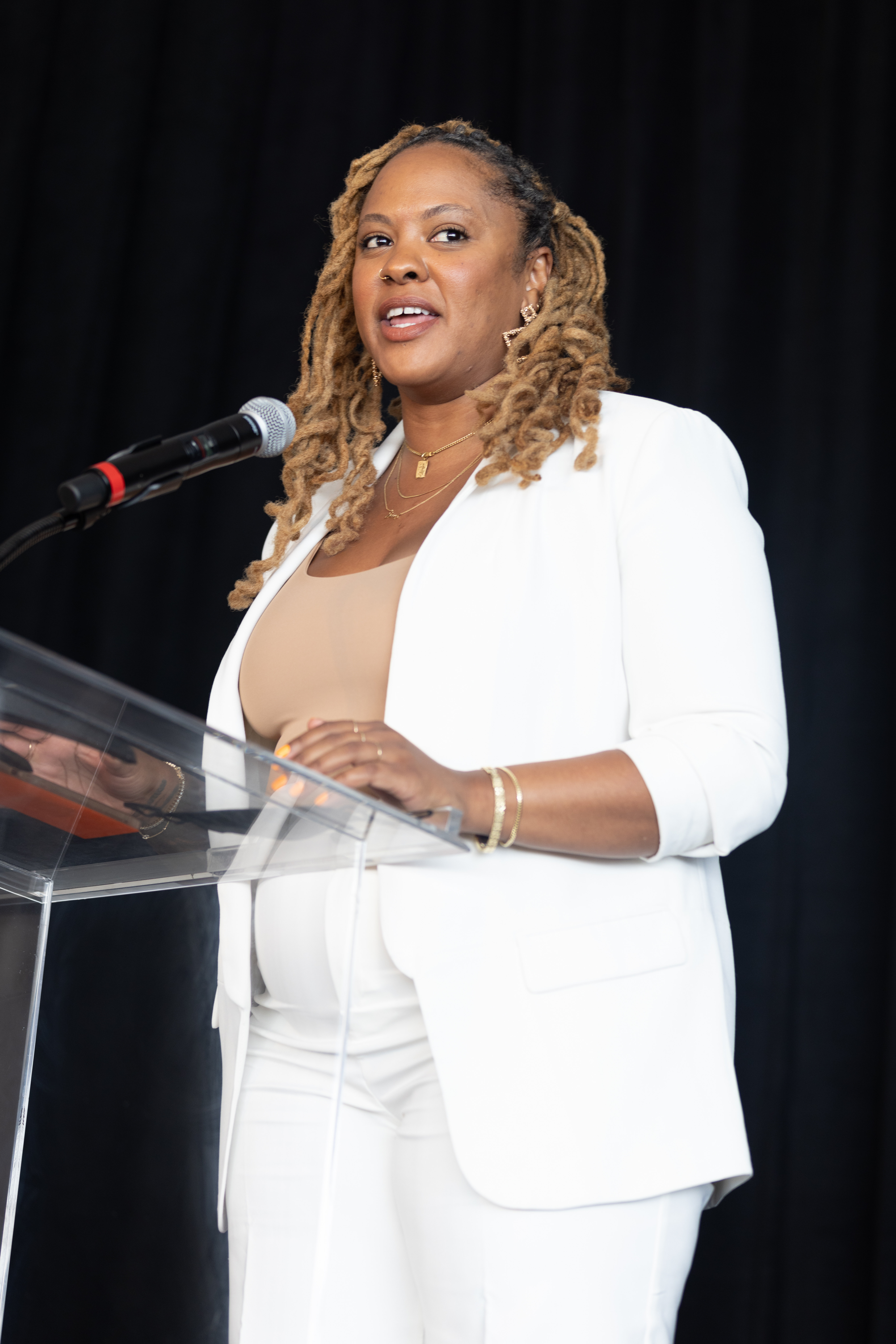
Hermelinda Cortés:
ReFrame was founded and grew out of a similar call; it wasn’t an acute moment or narrative tipping point. Rather, ReFrame emerged from hours spent planning impactful actions, scheming in bars after marches, panels at the US Social Forum, conversations in the hallways at conferences, and from an informal yet transformational network of communications strategists grounded in power building organizing.
The call was to chart a path for the next generation of strategists, cultural workers, narrative theorists, and organizers.


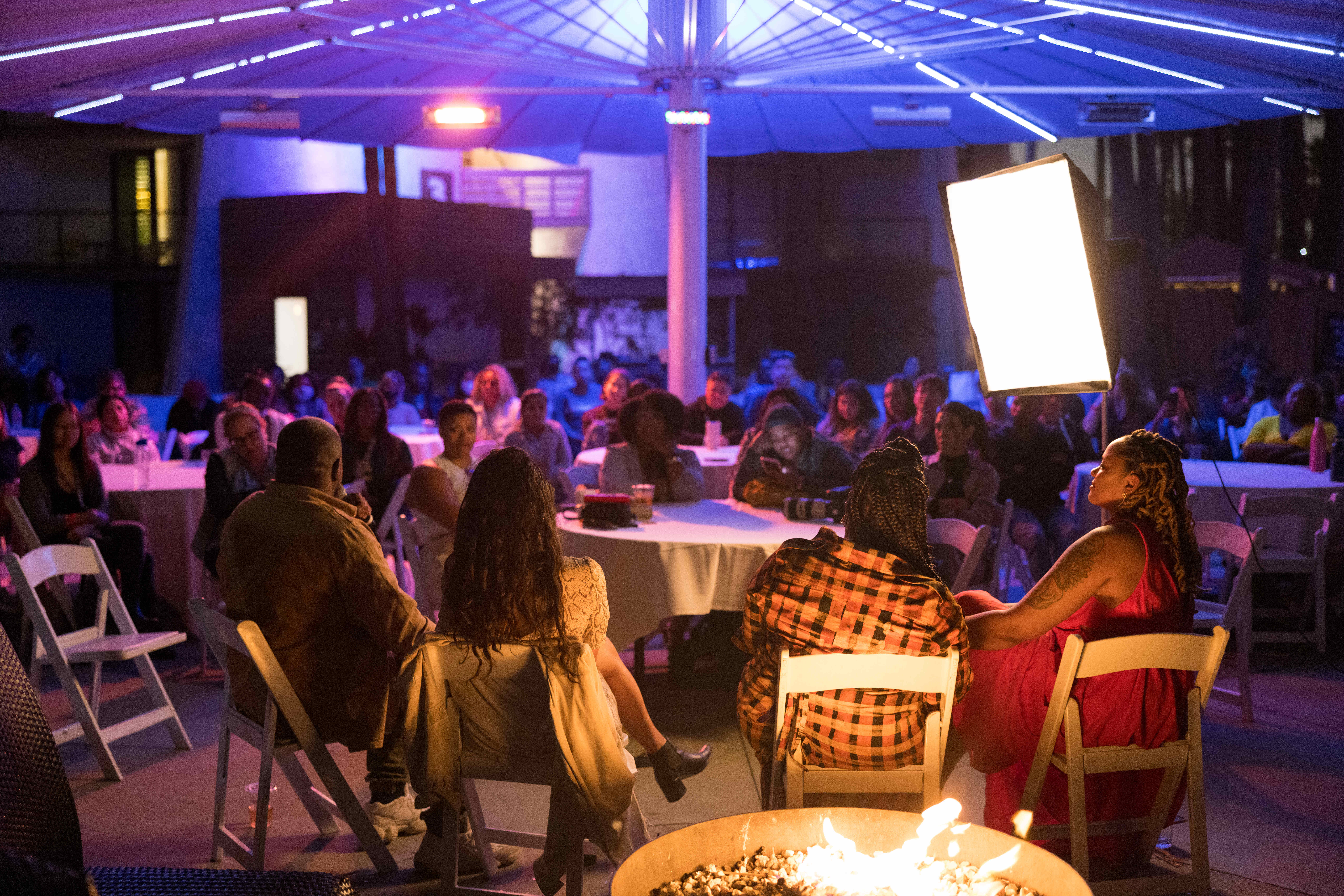
When we started as a mentorship eight years ago we committed ourselves to the work and proclaimed our dedication to building the next generation of communications strategists across racial, gender and economic justice movements. We pulled together amazing strategists who were foundational to the social movements of our day to mentor emerging leaders and co-create containers for growth, innovation, and networked connection.
Some of those mentors are here today, I see you: Shanelle Mathews, Chelsea Fuller, Jung Hee Choi.
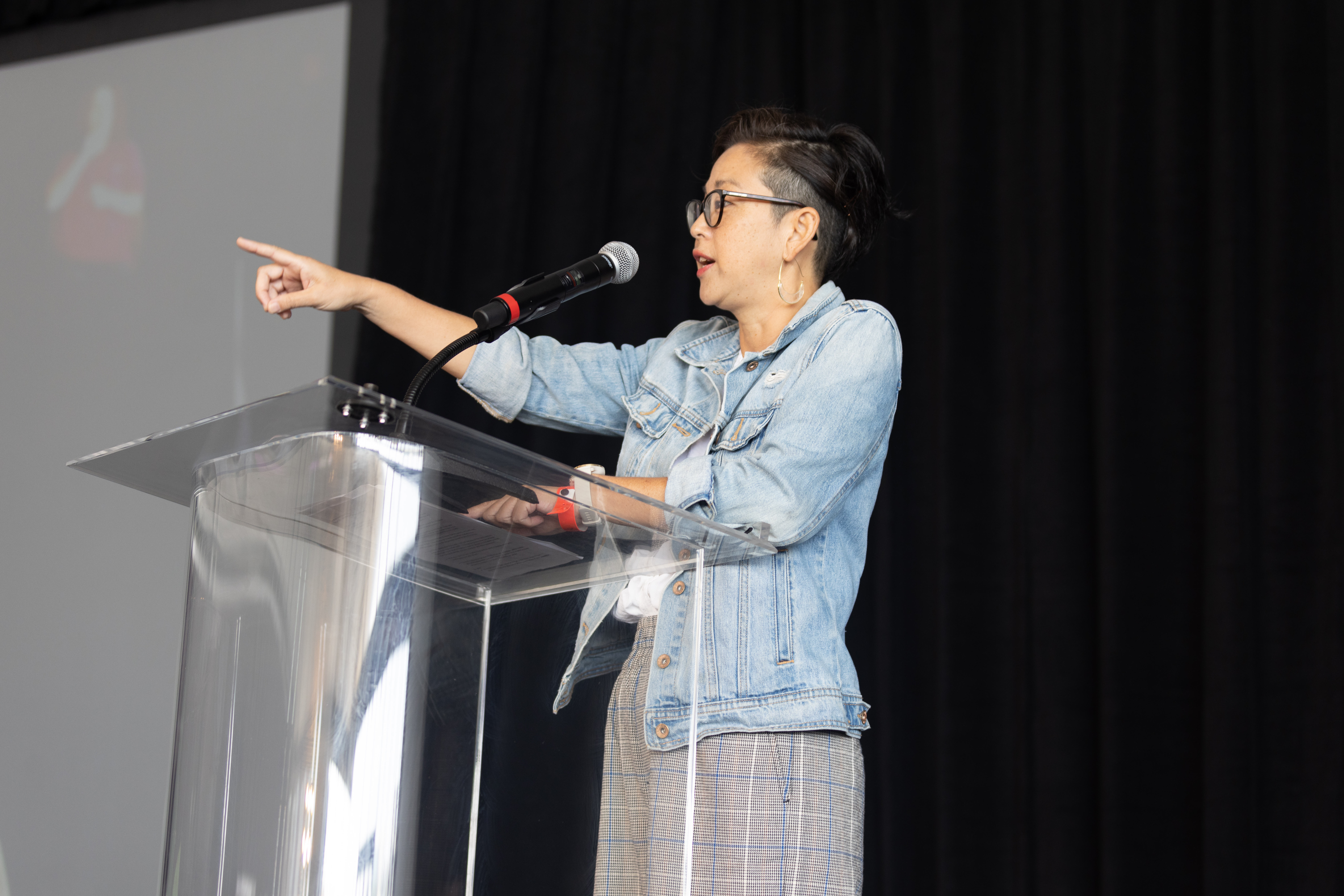
Some of those people who came through that program and are brilliant in their own right are also here today. I see you: JaNaé Bates, Jonathan Alingu, Fresco Steeze, Bia Jackson, Charles Curruthers, Aimee Castenell, Beulah Osueke, Kay Cuajunco, and Elbert Garcia.

Working with this community of mentors, trainers and strategists in our programs - we knew that we needed to do more. The mentorship wasn’t an elite program for a select few but the seeds of an approach that we wanted to grow - to build the ecosystem of leaders we need to contend for narrative power and to combat the ongoing onslaught of oppositional forces who would prefer us more dead than alive. We’ve never mistaken what the stakes are for our communities in our collective work in narrative and communications. The work of the people in this room is not fluff, it is a critical strand in a complex braid of the generational work of building a future and of making meaning that centers liberation and abundance.
So we got to work. More mentorships, more fellowships, more training. We built a state of the art narrative research operation known belovedly as our narrative weather station and we’ve ridden along with many of you in flashpoint and critical narrative tipping points to seize the opportunities to define our identities, policies, and material change in the lives of our people.

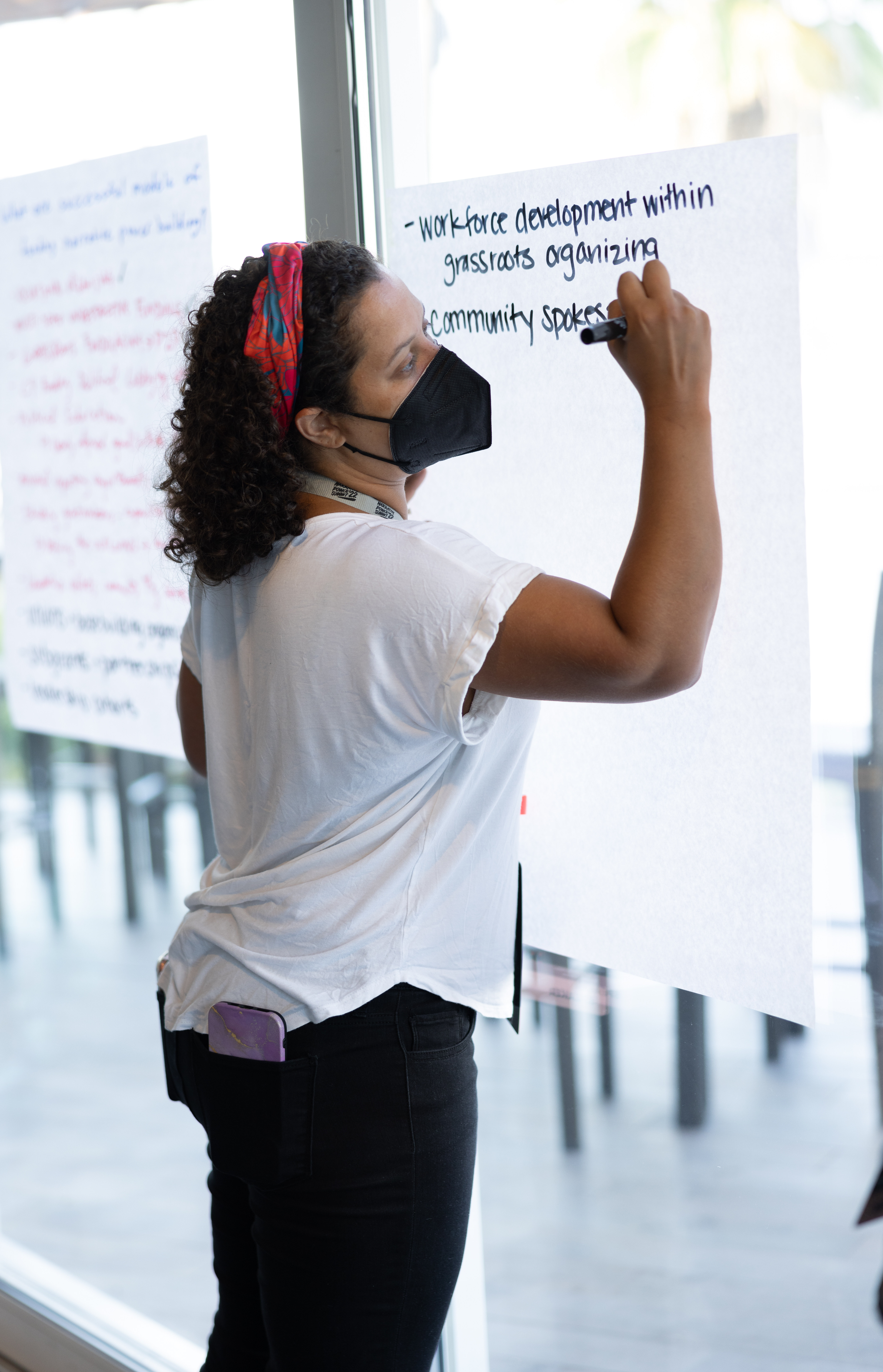
Eight years later, we’ve built with thousands of people. Many of you in this room have supported and participated in that work - from learning and leadership development, to narrative research and action, to building and supporting networks and movement infrastructure grounded in people.
ReFrame is here because we answered the call of our movements and organizations, and we are here today at the 2022 Narrative Power Summit because we answered the call from Shanelle and RadComms.
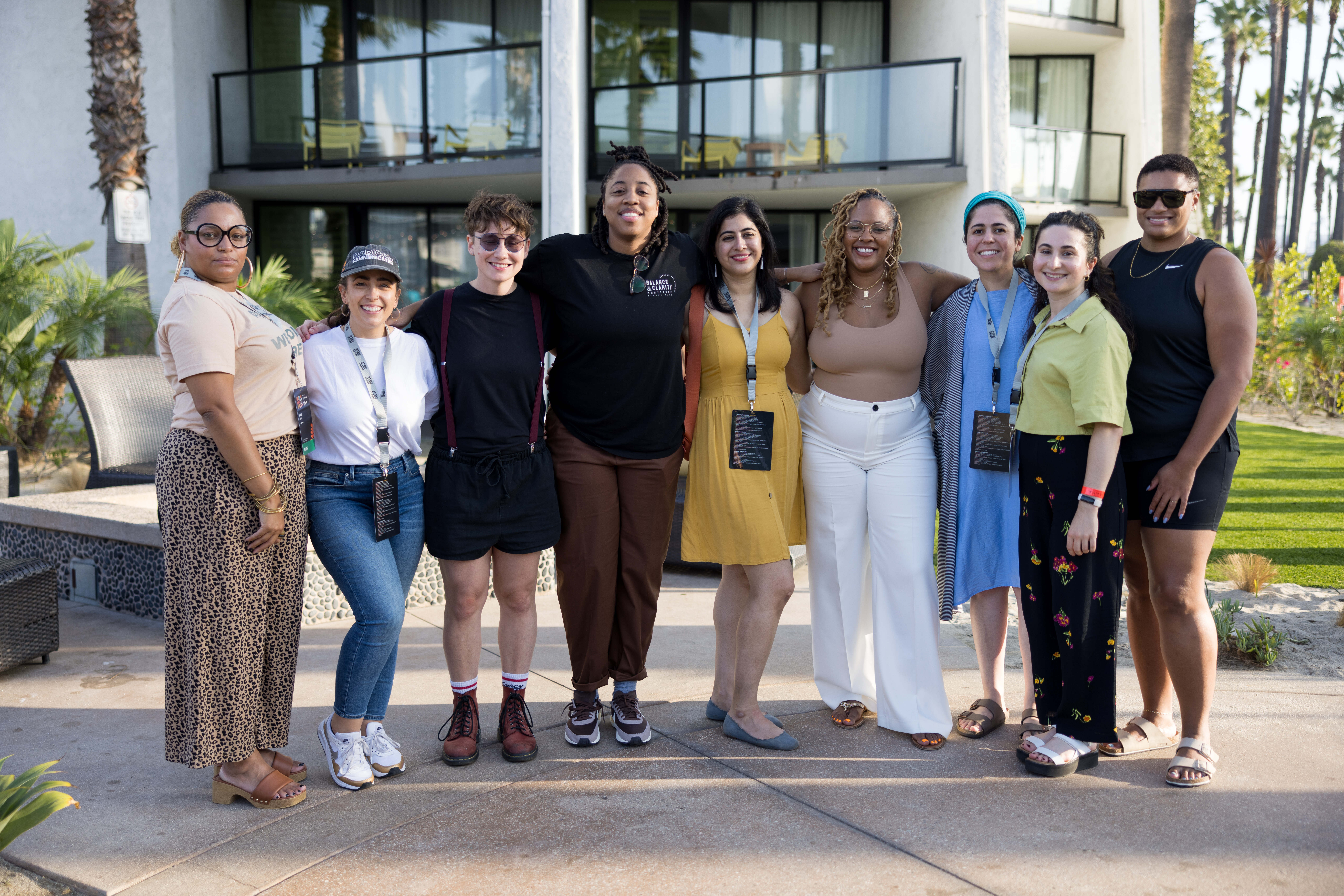
We answered the call because we know that in order to win we have to move beyond an obsession with the latest shiny thing, the latest magic bullet, the latest tool. We know that a hammer is just a lump of metal when there is no one to swing it. In order to win, we need people, we need you, we need the relationships that span geographies, issues, identities and to lean into solidarity in order to be greater than the sum of our parts. We need to encourage each other to take risks, to care for each other and to imagine narratives of the future even when we feel despair, when we’re tired and in grief. We need us and we’ve got us.
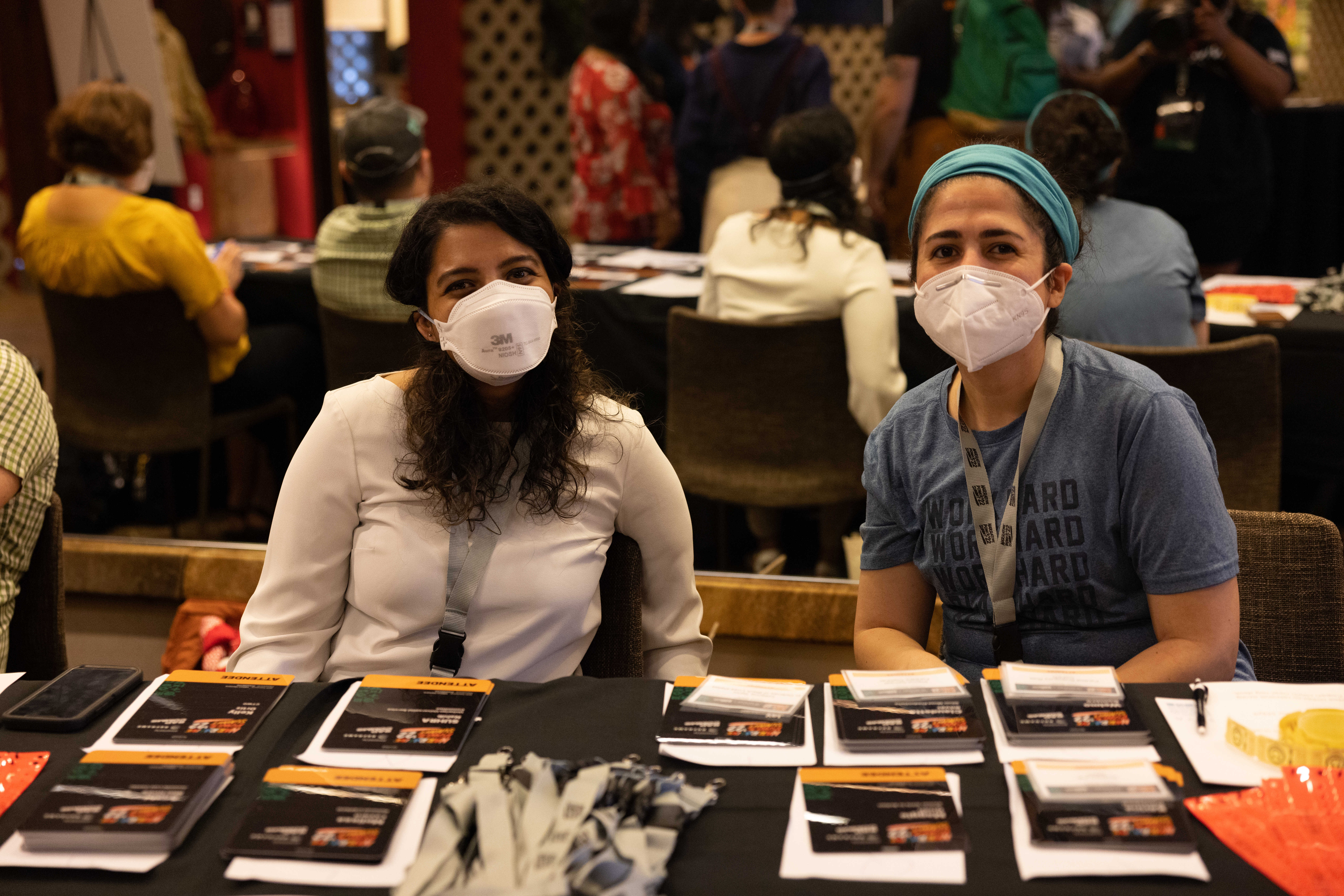

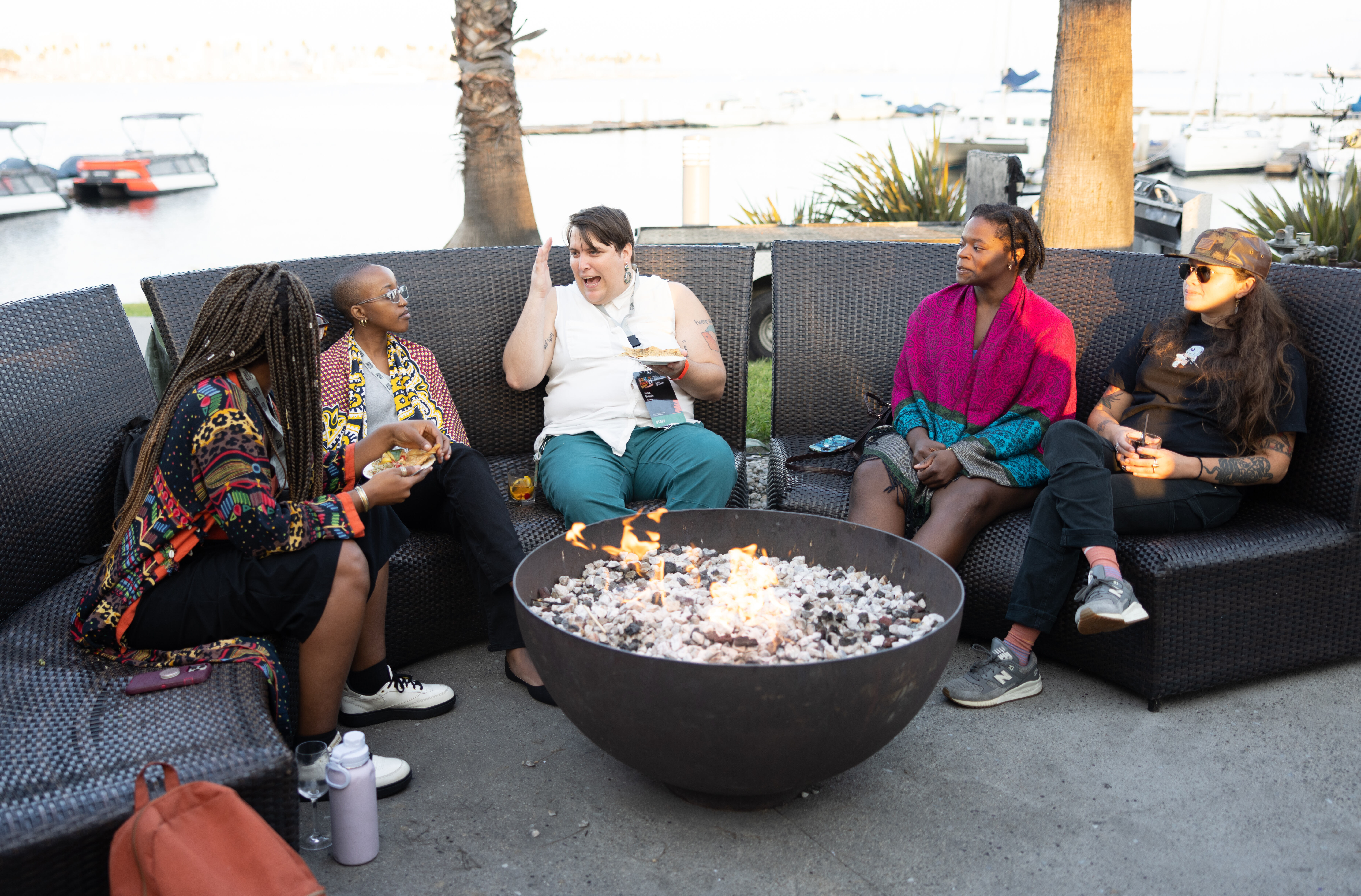
Joseph Phelan:
When Shanelle called on us at ReFrame we answered. When our lineage called on us we built ReFrame. But we did not answer alone.
Everyone attending the Summit answered this call as well. The work of building narrative power is all of our work. The basis for building power is relationships, and that is what we are doing here.

Sometimes relationship building is hard, effortful and requires us to lean into the values we espouse while managing our own lived experiences. Sometimes relationship building is uncomfortable because it requires growth or bending or challenging what we assume.
And sometimes, and these are my favorite times, building is magic and that connection is inspired, and you can feel that WE are building - that the relationships are exponential in their potential.


So this is the call:
Build relationships that are personal, but are ultimately political and purposeful. Build narrative power. Win the world we want and need.
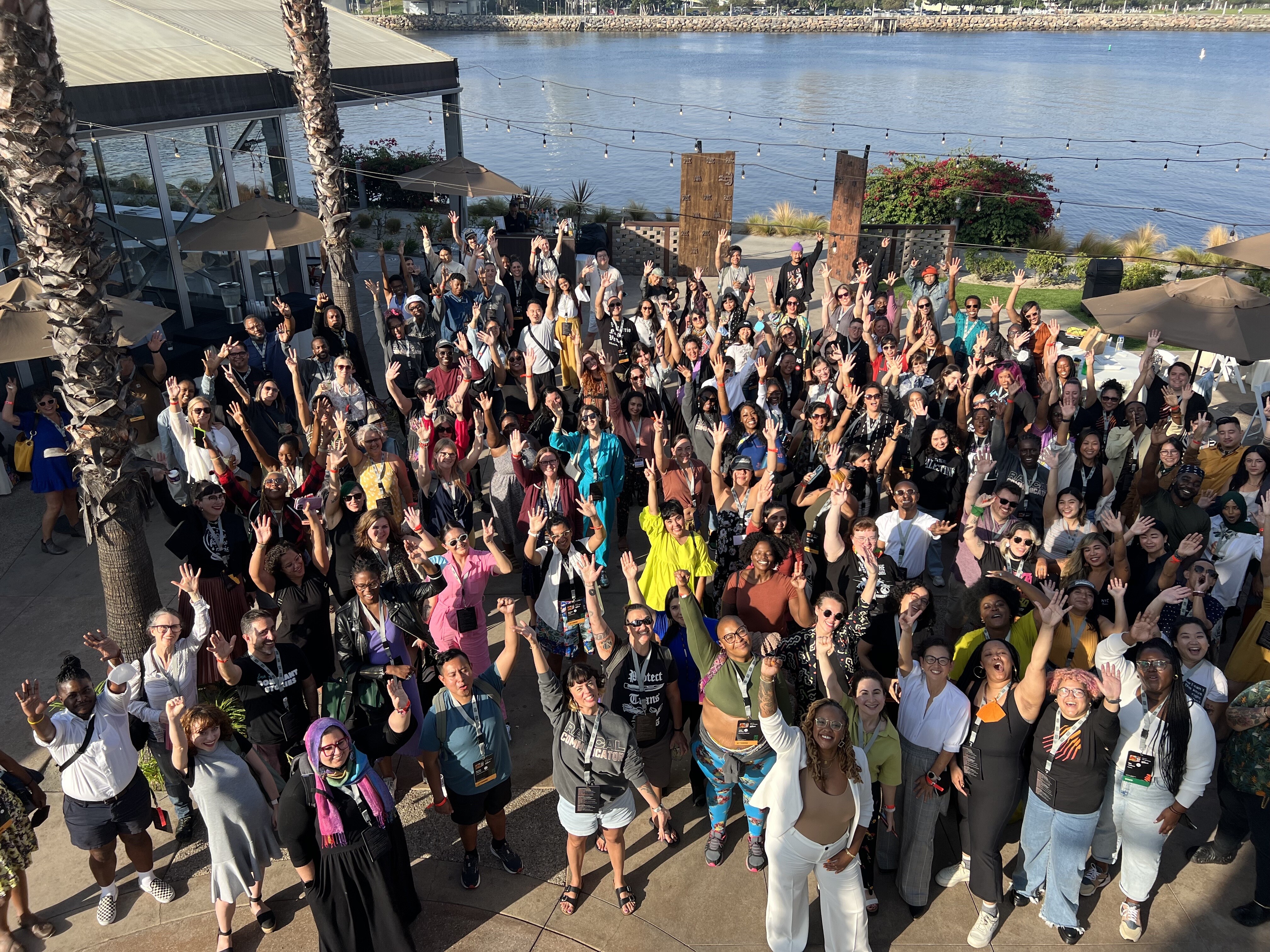
.png)
Join ReFrame on October 25th for Narrative Power 101! This free virtual training reviews the fundamentals of narrative and disinformation while offering new approaches and practical steps for your everyday work.
Calling all strategists, creatives, leaders, and dreamers who want to skill up to build narrative power and combat disinformation!
Join ReFrame on October 25th for Narrative Power 101!
This virtual training reviews the fundamentals of narrative and disinformation while offering new approaches and practical steps for your everyday work.
What: Narrative Power 101 virtual training with additional tools and resources
When: Live Training - Tuesday, October 25 at 2-4 PM PT | 4-6 PM CT | 5-7 PM ET
Who: Organizers, canvassers, leaders, communicators, directors, digital mavens and activists who want to skill up around narrative power-building, strategic communications, and combatting disinformation.
Where: This training will be delivered on our learning platform and over Zoom.
Register here: learning.thisisreframe.org/courses
Building narrative power is a team effort! Share this blog post with the information about this training with your coworkers, friends, and comrades.